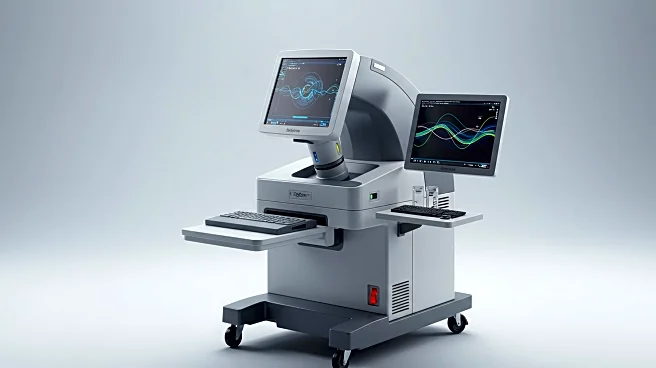What's Happening?
Thermo Fisher Scientific has received approval from the U.S. Food and Drug Administration (FDA) for its Oncomine Dx Target Test as a companion diagnostic to identify patients eligible for HERNEXEOS® (zongertinib tablets). This test is designed to detect HER2 (ERBB2) tyrosine kinase domain activating mutations in non-small cell lung cancer (NSCLC) tumors. The approval marks a significant advancement in targeted therapy for NSCLC, which accounts for 85-90% of lung cancer cases in the U.S. The FDA's decision was based on the objective response rate and duration of response, with continued approval contingent upon further clinical trials. The Oncomine Dx Target Test has been previously approved in 20 countries for various biomarkers and therapies, and is reimbursed by insurers globally.
Why It's Important?
The FDA approval of the Oncomine Dx Target Test as a companion diagnostic for HERNEXEOS® represents a critical development in the treatment of NSCLC, particularly for patients with HER2 mutations. This form of lung cancer is associated with poor prognosis and limited treatment options, making the availability of targeted therapies crucial. The approval not only enhances treatment possibilities for patients but also underscores the importance of precision medicine in oncology. Thermo Fisher's collaboration with Boehringer Ingelheim highlights the role of companion diagnostics in identifying suitable candidates for specific therapies, potentially improving patient outcomes and advancing cancer treatment strategies.
What's Next?
Following the FDA approval, Thermo Fisher and Boehringer Ingelheim will likely focus on conducting confirmatory trials to verify the clinical benefits of HERNEXEOS®. The continued expansion of companion diagnostics and rapid next-generation sequencing solutions by Thermo Fisher may lead to further advancements in personalized medicine. Stakeholders, including healthcare providers and insurers, will be monitoring the outcomes of these trials to assess the long-term efficacy and cost-effectiveness of the treatment. Additionally, the approval may encourage further research and development in targeted therapies for other cancer types.








